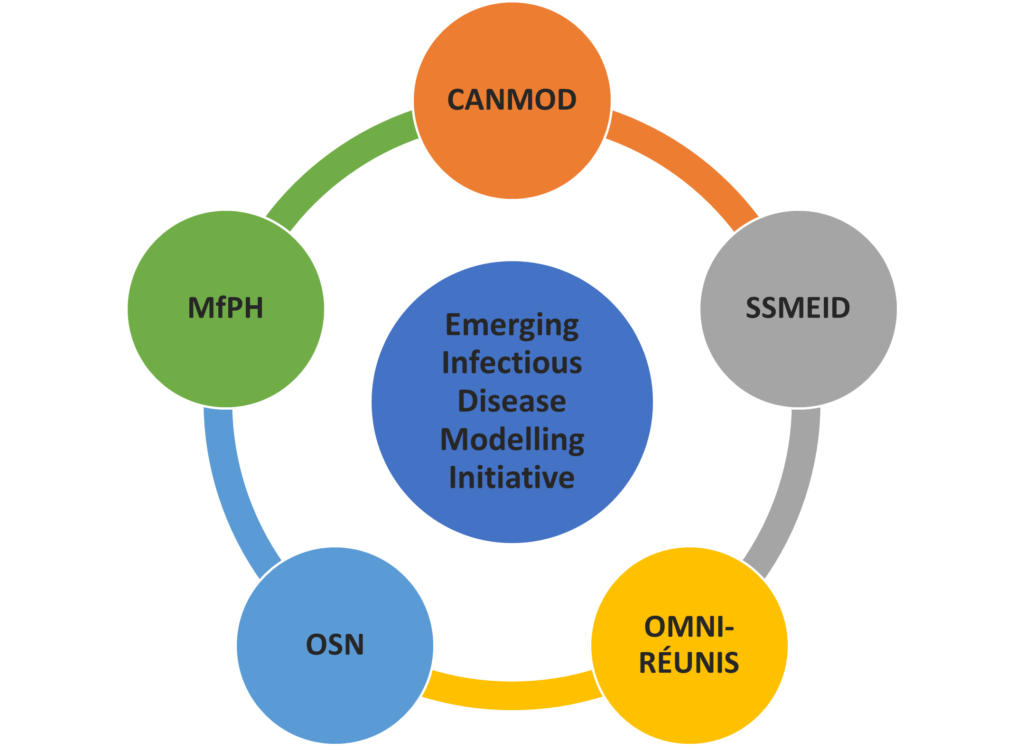OMNI/RÉUNIS is part of the broader Emerging Infectious Diseases Modelling Initiative consortium which aims to establish multi-disciplinary networks of specialists across the country in modelling infectious diseases to be applied to public needs associated with emerging infectious diseases and pandemics such as COVID-19.

The Public Health Agency of Canada (PHAC) and Natural Sciences and Engineering Research Council of Canada (NSERC) are working together to strengthen collaborative efforts among the academic community and all relevant stakeholders to conduct and coordinate infectious diseases modelling to better respond to COVID-19 and other emerging diseases.
One Health Network for Emerging Infections (OMNI- RÉUNIS) – York University
The One Health Modelling Network for Emerging Infections (OMNI)/Réseau une seule santé sur la modélisation des infections (RÉUNIS), led by three Co-Directors, Dr. Huaiping Zhu at the York University, Dr. Hélène Carabin at the Université de Montréal and Dr. Mark Lewis at the University of Alberta, approaches emerging infectious disease (EID) modelling by using a One Health (OH) approach with a strong emphasis on developing and using inter- and transdisciplinary models to inform prevention, surveillance and response. A unique aspect of this network is how we will directly incorporate the One Health transdisciplinary approach in addressing problems at the intersection of people, animals, and their environments, into our modelling research and training capacity to solve many emerging infectious disease challenges.
OMNI-RÉUNIS is joined by four other Canadian networks in the Consortium:
Statistical Methods for Managing Emerging Infectious Diseases (SMMEID)
Statistical Methods for Managing Emerging Infectious Diseases, led by Dr. Patrick Brown at the University of Toronto, will develop methods and tools to get an accurate picture of the nature and extent of infectious disease transmission in the population, relying on real-world data from administrative sources and surveys. They are seeking to augment Canada’s capacity to respond to emerging infectious diseases.
Canadian Network for Modelling Infectious Disease (CANMOD)– Simon Fraser University
The Canadian Network for Modelling Infectious Disease (CANMOD), led by Dr. Caroline Colijn at Simon Fraser University, will increase Canada’s capacity for infectious disease modelling to directly support short, medium, and long-term public health decisions. It will build and coordinate national capacity by sharing research problems, models and estimates, data files and expertise among researchers in academia, industry and the public sector.
One Society Network (OSN) – University of Alberta
The One Society Network, led by Dr. Christopher McCabe at the University of Alberta, will include developing modelling for evaluating alternative policy responses during pandemics for all sectors of the economy and aspects of society, including marginalised groups. They will also be collaborating on multi-disciplinary training programs for skills development to support public policy making in future pandemics.
Mathematics for Public Health (MfPH) – University of Toronto
Mathematics for Public Health (MfPH), led by Dr. V. Kumar Murty, Director of the Fields Institute and Professor at the University of Toronto, will aim to bridge the gap between mathematical research and real public health issues. The team will seek to produce models that are effective, practical and reliable for applications to public health issues for COVID-19 as well as boost Canada’s future pandemic preparedness.
